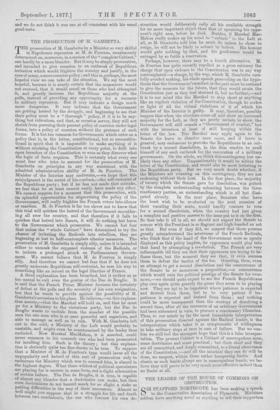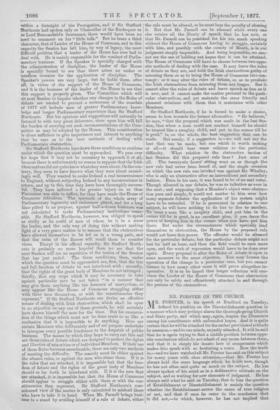THE LEADER OF THE HOUSE OF COMMONS ON OBSTRUCTION.
SIR STAFFORD NORTHCOTE has been making a speech to the Conservative Association of Plymouth. Ministers seldom have anything novel or startling to tell their supporters -within a fortnight of the Prorogation, and if Sir Stafford orthcote had spoken only as Chancellor of the Exchequer or as Lord Beaconsfield's lieutenant, there would have been no Zeed to comment on his "little talk." But he bears a third character, that of Leader of the House of Commons, and in this capacity the Session has left him, by way of legacy, the most difficult problem that a leader of the House has ever had to deal with. He is mainly responsible for the conduct of Parlia- mentary business. If the Speaker is specially charged with the administration of discipline, the leader of the House is specially bound to see that there arises no undue or needless occasion for the application of discipline. The Speaker's powers are very large, but he holds them, after all, in virtue of the support of the House of Commons, and it is the business of the leader of the House to see that this support is properly given. The Committee which will sit next Session to inquire whether any changes in the Rules of debate are needed to prevent a recurrence of the scandals of 1877 will include men of greater Parliamentary know- ledge and longer Parliamentary experience than Sir Stafford North oath, But his opinions and suggestions will naturally be listened to with very great deference, since upon him will fall the burden of carrying out such recommendations of the Com- mittee as may be adopted by the House. This consideration is alone sufficient to give importance and interest to anything that he says as to the best methods of dealing with Parliamentary obstruction. Sir Stafford Northcote lays down three conditions or cautions under which the question must be approached. We pass over his hope that it may not be necessary to approach it at all, because there is unfortunately no reason to suppose that the Irish Obstructives did not quite know what they were about. On the con- trary, they seem to have known what they were about exceed- ingly well. They wanted to make Ireland a real inconvenience to England, without subjecting Ireland to any inconvenience in return, and up to this time they have been thoroughly success- ful. They have inflicted a far greater injury on us than Fenianisra was able to inflict, for they have made the House of Commons ridiculous. The spectacle of the whole array of Parliamentary ingenuity and endurance pitted, and for a long time pitted to no purpose, against half-a-dozen Irishmen was not calculated to make Parliamentary institutions vener- able. Sir Stafford Nortlicote, however, was obliged to speak as civilly as he could of men of whom he is in a sense the leader, and the only way of doing this without making light of a very grave matter is to assume that the obstructives have allowed themselves to be led on in a wrong path, and that the calm of the Recess will recall them to sounder views. Except in his official capacity, Sir Stafford North- cote is probably no more hopeful than we are that the next Session will see no repetition of the tactics of the Session that has just ended. The three conditions, then, under which the question must be approached are, first, that the fair and full freedom of debate be not interfered with ; secondly, that the rights of the great body of Members be not infringed ; thirdly, that any steps which it may be necessary to take against particular men be not taken "in a manner that may give them anything like the honours of martyrdom, or may appear like the House of Commons struggling either with these men themselves, or with the constituencies they represent." If Sir Stafford Northcote can devise an effective means of dealing with Irish obstruction, which shall be open to no objection on any one of these grounds, he will certainly have shown himself the man for the time. But his enumera- tion of the things which must not be done reads to us like a confession that it is impossible to do anything. Here are certain Members who deliberately and of set purpose undertake to interpose every possible hindrance to the despatch of public business. The means by which they hope to carry out this end are those rulea of debate which are designed to protect the rights and liberties of minorities or of individual Members. If their use of these Rules becomes unendurable, there are only two methods of meeting the difficu]ty. The remedy must lie either against the abused rules, or against the men who abuse them. If it is the rules that are attacked, it is impossible but that the free- dom of debate and the rights of the great body of Members should so far forth be interfered with. If it is the men that are attacked, it is impossible but that the House of Commons should appear to struggle either with them or with the con- stituencies they represent. Sir Stafford Northcote's rose- coloured view of the matter is only calculated to mislead those 'who have to take it in hand. When Mr. Parnell brings busi- ness to a stand by availing himself of a rule of debate, either the rule must be altered, or he must bear the penalty of abusing it. But that Mr. Parnell can be silenced while every one else retains all the liberty of speech that he has now, or that Mr. Parnell can be punished for his too much speaking without the House of Commons having to struggle, certainly with him, and possibly with the county of Meath, is in our judgment simply impossible. And being impossible, we can- not see the use of holding out hopes that it can be attained. The House of Commons will have to choose between two oppo- site methods of dealing with the case. It may leave the rules of debate as they are, and hold the Irish obstruotives guilty -of misusing them so as to bring the House of Commons into con- tempt ; or it may alter the rules of debate, so as to preclude the Irish obstructives from misusing them any longer. But it cannot alter the rules of debate and leave speech as free as it is now, and it cannot make the matter personal to the parti- cular obstructives, and yet maintain the same friendly and pleasant relations with them that it maintains with other Members.
Sir Stafford Northcote, if he is forced to make a choice, seems to lean towards the former alternative. " He believes,' he says, " that the proposal which was made in the last Ses- sion, that when a man could not conduct himself he should be treated like a naughty child, and put in the corner till he is good," is, on the whole, the best suggestion that can be made. But surely, if a suggestion is—we will not Bay the best that can be made, but one which is worth making at all—it should bear some relation to the particular difficulty. What relation to the obstructive tactics of last Session did this proposed rule bear ? Just none at all. The twenty-six hours' sitting went on as though the new rule had never been heard of, and the single occasion on which the new rule was invoked was against Mr. Whalley, who is only an obstructive after an intermittent and secondary fashion. Even in his case, it was found to be of no real value. Though silenced in one debate, he was as talkative as ever in the next ; and supposing that a Member's object were obstruc- tion pure and simple, it would not matter to him over how many separate debates the application of his system might have to be extended. If he is persecuted in relation to one subject, he will have nothing to do but to flee to another. To treat a man like a naughty child, and put him in the corner till he is good, is an excellent plan, if you have the power of keeping him in the corner when you have put him there. But under the circumstances which specially lend themselves to obstruction, the House by the proposed rule would not have this power. The offender would be silenced for the particular debate, but the particular debate might not last for half an hour, and then the field would be once more open, and the work of repression would have to be done over again. Every proposal to alter the Rules of debate is open in some measure to the same objection. You may foresee the operation of the change in a particular case, but you cannot foresee in how many other cases it will prove altogether in- operative. It is to be hoped that longer reflection will con- vince the Leader of the House of Commons that obstruction can only be safely and efficaciously attacked in and through the persons of the obstructives.































 Previous page
Previous page